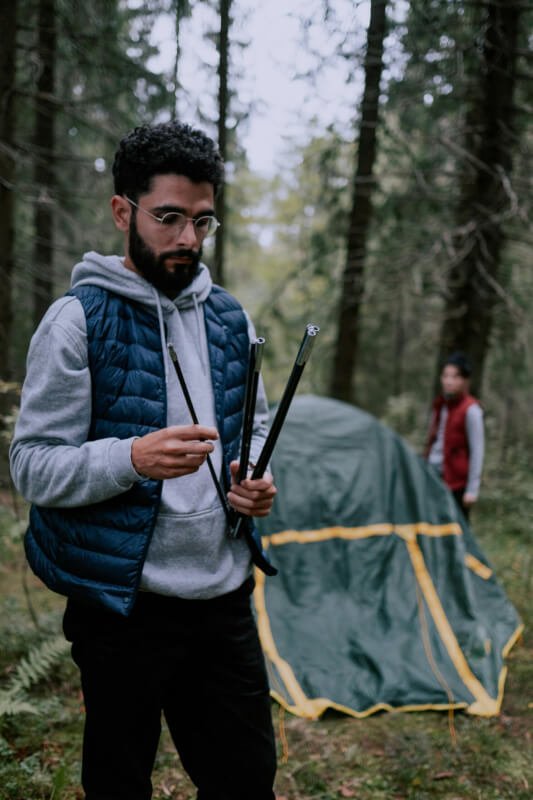Are you an outdoor enthusiast looking for ways to minimize your impact on the environment while camping? Look no further! This article provides a concise guide on the best camping practices that align with the principles of Leave No Trace. Whether you’re a seasoned camper or new to the wilderness, these tips will help you enjoy the great outdoors responsibly, leaving behind nothing but footprints and unforgettable memories. From proper waste disposal to respecting wildlife, this article covers it all. So grab your gear and get ready to embark on an eco-friendly camping adventure!
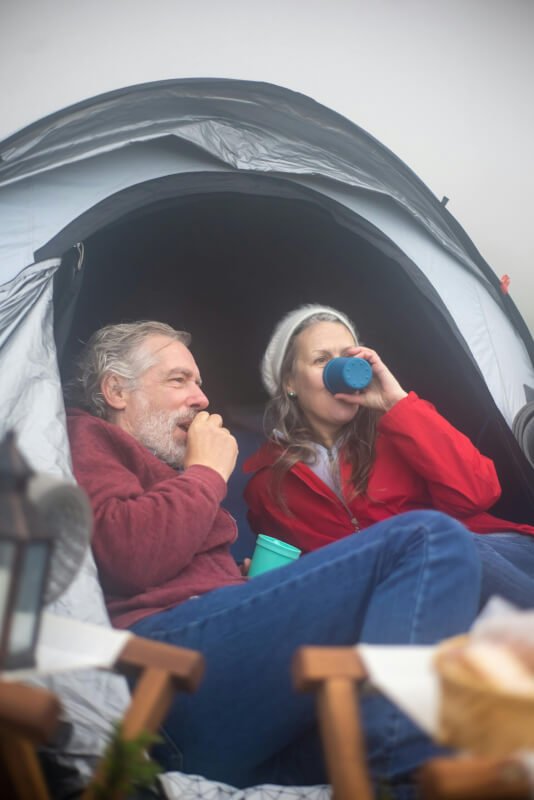
Planning and Preparation
Research and choose appropriate campsites
When planning your camping trip, it is important to research and choose appropriate campsites that align with the principles of Leave No Trace. Look for designated campsites in established camping areas that have been designated by the land management agency. These designated campsites have already been impacted by camping activities and are a better choice than creating new campsites.
Obtain necessary permits and permissions
Before heading out on your camping adventure, make sure to obtain any necessary permits and permissions. This may be required for certain areas, especially if you plan to camp in protected wilderness areas or national parks. Check with the appropriate land management agency to ensure you are following all regulations and guidelines.
Plan and pack for minimal impact
When planning for your camping trip, it is important to pack in a way that minimizes your impact on the environment. Consider the following tips:
- Pack lightweight and compact gear to minimize space and weight.
- Choose reusable containers and utensils instead of single-use items.
- Bring biodegradable soap for washing dishes and personal hygiene.
- Opt for eco-friendly alternatives to traditional camping supplies, such as biodegradable toilet paper and trash bags.
Taking the time to plan and pack for minimal impact will ensure that you are able to enjoy the outdoors while preserving its beauty for future generations.
Campsite Selection
Follow designated campsites and avoid creating new ones
When choosing a campsite, it is important to follow designated campsites and avoid creating new ones. Using established campsites helps to concentrate camping impact in specific areas, reducing the overall impact on the environment. Creating new campsites can lead to the destruction of vegetation and soil erosion.
Choose durable surfaces for tents and other equipment
When setting up your tent or other equipment, choose durable surfaces such as established tent pads or bare ground. Avoid setting up your campsite on fragile vegetation or in sensitive areas where wildlife may be affected. By selecting durable surfaces, you can minimize your impact and protect the natural environment.
Stay a safe distance from water sources
While camping, it is crucial to stay a safe distance from water sources such as rivers, lakes, and streams. This helps to protect fragile riparian areas and minimizes the risk of contamination. Stay at least 200 feet away from water sources to ensure the quality of the water remains pristine.
Consider impact on vegetation and wildlife
When selecting a campsite, consider the impact your presence may have on the surrounding vegetation and wildlife. Choose campsites that minimize trampling of vegetation and avoid disturbing wildlife habitats. By being mindful of the impact you have as a camper, you can help preserve the natural beauty and balance of the ecosystem.

Campfire Responsibilities
Check fire regulations and restrictions
Before starting a campfire, it is important to check for any fire regulations or restrictions in the area you plan to camp. Some regions may have a complete ban on campfires due to fire risk or environmental concerns. Always adhere to these regulations to prevent wildfires and protect the natural environment.
Use established fire rings or fire pans
When choosing a location for your campfire, use established fire rings or fire pans whenever they are available. These designated areas have already been impacted by fire and provide a safer and more controlled environment for your campfire. If there are no established fire rings, use a fire pan to contain the fire and prevent damage to the ground.
Keep the fire small and manageable
When building a campfire, it is important to keep it small and manageable. A small fire is easier to control and produces less smoke, reducing the impact on air quality. Only burn the amount of wood necessary for your needs and avoid using large logs or woody debris that may take longer to burn.
Extinguish the fire properly
Before leaving your campsite or going to bed at night, make sure to properly extinguish your campfire. Use water to completely douse the fire, stirring the ashes and embers until they are cool to the touch. This ensures that the fire is completely out and reduces the risk of a potential wildfire.
Waste Management
Pack it in, pack it out
One of the most important principles of Leave No Trace is to pack out all waste that you bring with you. This includes not only trash but also any food scraps, wrappers, and other materials. By packing out your waste, you are ensuring that the natural environment remains clean and pristine for others to enjoy.
Dispose of human waste properly
Proper disposal of human waste is essential to prevent contamination of water sources and minimize the spread of disease. When camping in areas without established restrooms, follow these guidelines:
- Dig a cathole at least 6 to 8 inches deep and 200 feet away from water sources.
- After use, cover the cathole with soil and natural materials to help with decomposition.
- Never dispose of toilet paper or hygiene products in the cathole. Pack them out with your trash.
By properly disposing of human waste, you are helping to protect both the environment and the health of fellow campers.
Use biodegradable soap and rinse at least 200 feet from water sources
When washing dishes or personal items, use biodegradable soap to minimize the impact on the environment. Rinse these items at least 200 feet away from water sources to prevent contamination. Biodegradable soap breaks down naturally and does not harm aquatic life, ensuring the health of the ecosystem.
Minimize greywater impact
Greywater, which is the water produced from washing dishes or personal hygiene, should be minimized and disposed of properly. Avoid using excessive amounts of water when washing, and scatter the greywater over a large area away from campsites and water sources. This allows the water to filter through the soil naturally and reduces the impact on vegetation and wildlife.
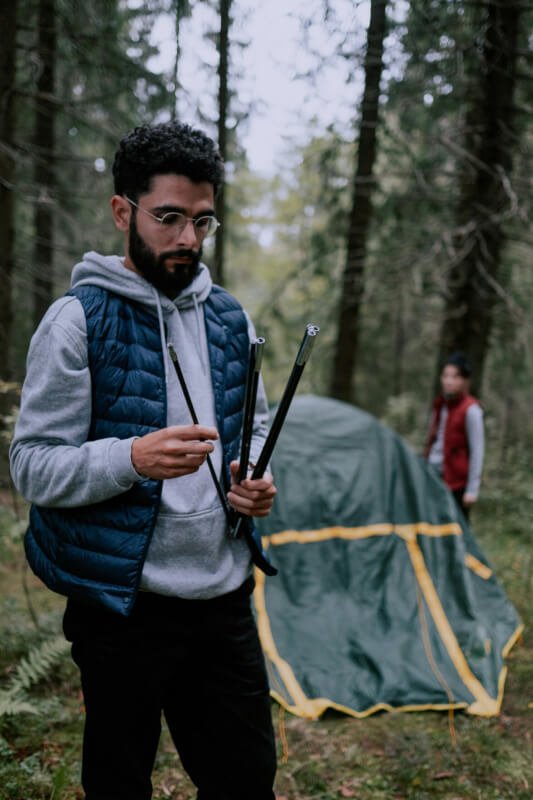
Respect Wildlife
Observe wildlife from a distance
When encountering wildlife during your camping trip, it is important to observe them from a safe distance. Maintain a respectful distance and use binoculars or a camera with a zoom lens to get a closer look. This allows wildlife to carry on with their natural behaviors without feeling threatened or disturbed.
Stay quiet and minimize disturbance
To respect wildlife, it is crucial to stay quiet and minimize any disturbance. Avoid loud noises, sudden movements, or actions that may startle or stress the animals. By being mindful of your impact on the surrounding wildlife, you can help maintain the balance and natural behavior of the ecosystem.
Do not feed or approach animals
Feeding or approaching animals is not only dangerous for both you and the wildlife, but it can also disrupt their natural behavior and diet. Feeding wildlife can create dependence on humans and lead to negative impacts on their health and natural behaviors. For the safety and well-being of both you and the animals, always observe them from a distance and avoid any form of interaction.
Leave What You Find
Do not collect natural or cultural artifacts
A fundamental principle of Leave No Trace is to leave natural and cultural artifacts undisturbed. It may be tempting to collect shells, rocks, or other items, but taking them from their natural environment disrupts the delicate balance and ecosystem. Appreciate and admire these items in their natural setting and leave them for others to enjoy.
Leave rocks, plants, and other objects undisturbed
When exploring the outdoors, resist the urge to move or rearrange rocks, plants, or any other objects you may come across. Disturbing these natural features can have long-lasting impacts on the environment and the habitat for wildlife. Preserve the natural beauty and integrity of the area by leaving everything exactly as you found it.
Avoid damaging or altering natural features
As a responsible camper, it is crucial to avoid damaging or altering natural features such as trees, cliffs, or geological formations. These features play an important role in the ecosystem and provide habitats for wildlife. By preserving these natural features, you are ensuring the longevity and health of the environment.
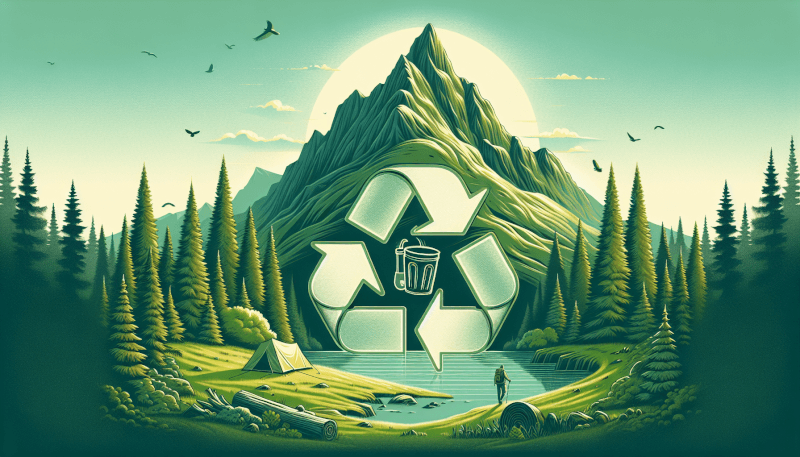
Minimize Campfire Impact
Use lightweight camping stoves instead of fires
To minimize your impact on the environment and reduce the risk of wildfires, consider using lightweight camping stoves instead of fires for cooking. These stoves are efficient, portable, and leave no trace behind. They also eliminate the need to gather firewood, reducing the impact on vegetation.
Keep a small fire for cooking instead of a large one
If you choose to have a campfire for cooking, keep it small and only burn the amount of wood necessary to prepare your meals. A small fire reduces the impact on air quality and minimizes the risk of uncontrollable flames. Remember to follow any fire regulations or restrictions in the area and properly extinguish the fire when finished cooking.
Only burn small sticks and sticks found on the ground
When gathering firewood for your campfire, only burn small sticks and sticks found on the ground. Avoid cutting or breaking branches from living trees, as this causes unnecessary damage to the vegetation. By using naturally fallen wood, you are minimizing your impact on the environment and preserving the beauty of the area.
Respect Other Visitors
Maintain a reasonable noise level
Respecting other visitors means being mindful of your noise level and how it may impact those around you. Keep conversations, music, and other activities at a reasonable volume to avoid disturbing the tranquility of the camping area. This allows everyone to enjoy their outdoor experience in peace.
Give space to others and avoid crowding
When camping, it is important to give space to other visitors and avoid crowding their campsites or designated areas. Respect personal boundaries and give others the opportunity to enjoy their camping experience without feeling crowded or intruded upon. By being considerate of others, you can create a positive and harmonious community during your outdoor adventure.
Be courteous and friendly
A friendly and courteous attitude goes a long way in creating a positive camping experience for everyone involved. Greet fellow campers with a smile, offer assistance if needed, and always follow proper campground etiquette. By being kind and respectful, you can contribute to a welcoming and enjoyable environment for all.
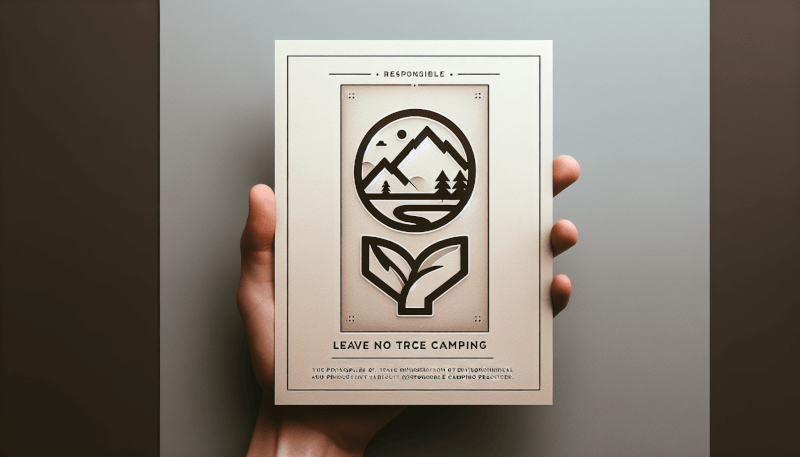
Dispose of Trash Properly
Pack out all trash, including microtrash
Leaving no trace means packing out all trash, including microtrash. Microtrash refers to small items such as bottle caps, wrappers, and cigarette butts that can easily be overlooked. Always make sure to thoroughly clean your campsite and pack out every single piece of trash to maintain the pristine beauty of the outdoors.
Separate recyclables from non-recyclables
When disposing of your trash, separate recyclable items from non-recyclables whenever possible. Many camping areas have designated recycling bins or stations where you can properly dispose of these items. By separating these materials, you are reducing the amount of waste that ends up in landfills and contributing to a more sustainable environment.
Properly dispose of hazardous materials
Hazardous materials should never be left behind or disposed of improperly. This includes batteries, propane canisters, and any other items that may pose a risk to the environment or other campers. Follow the proper procedures for disposing of these materials, which may include recycling or taking them to a designated hazardous waste facility.
Educate and Encourage Others
Spread awareness about Leave No Trace principles
One of the best ways to minimize impact on camping areas is by spreading awareness about Leave No Trace principles. Share your knowledge and experiences with others, both in person and through social media platforms. By educating others, you can inspire them to adopt these practices and help preserve the beauty of the outdoors for generations to come.
Lead by example and teach others how to minimize impact
Actions speak louder than words, so lead by example when practicing Leave No Trace principles. Show others how to properly dispose of waste, set up a campsite with minimal impact, and respect the environment and wildlife. Teach others the importance of leaving no trace and encourage them to do the same.
Promote responsible camping practices
As an advocate for responsible camping practices, promote and support initiatives that prioritize environmental stewardship. Join local conservation organizations or volunteer for cleanup efforts in camping areas to make a positive impact. By actively participating in these activities, you can contribute to the preservation of our natural spaces and inspire others to do the same.
In conclusion, practicing the principles of Leave No Trace is essential for maintaining the beauty and sustainability of our camping areas. By researching and choosing appropriate campsites, respecting wildlife, minimizing campfire impact, properly disposing of waste, and educating others, you can enjoy the great outdoors while minimizing your environmental footprint. Remember, it is up to each individual camper to take responsibility for their actions and contribute to the long-term preservation of our precious natural resources. Happy camping!

